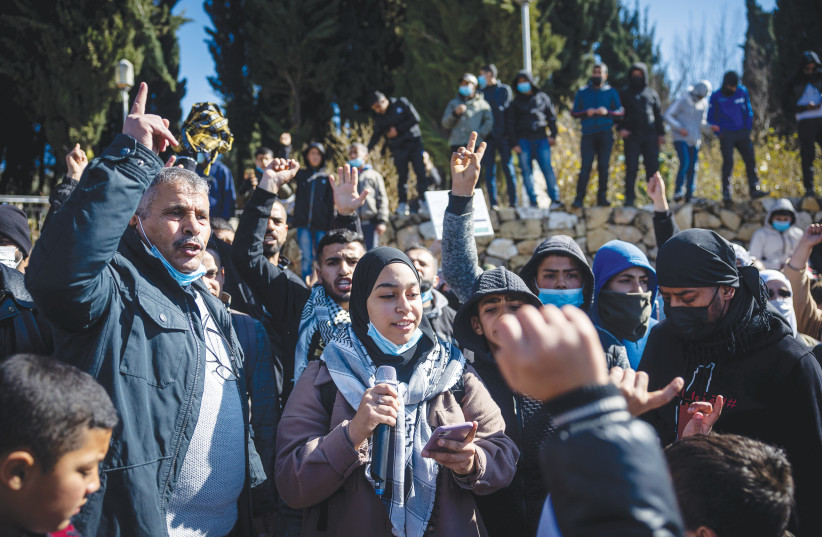Amid the war in Gaza, Hamas’s continued goal to fan the flames of tensions within Israel, and in light of events of Operation Guardian of the Walls in 2021, one must wonder, is the possibility of violent outbreaks in the Negev by Bedouins being taken into account? Is there any consideration of preparing, not only at the cabinet meeting, regarding the Temple Mount, but also by the southern leadership and other entities for this scenario?
It's not even necessary to mention the events that occurred during the Guardian of the Walls Operation. It is well remembered by us as a wave of violent outbreaks, which were unprecedented in their scope and extremity and were committed throughout the country. The main locations of these events occurred in mixed cities and across the Negev.
While Hamas launched thousands of rockets into Israel, criminals among Israel’s Arab citizens opened another front from within Israel. Roads were blocked, streetlights were destroyed, and acts of vandalism were frequent. Vehicles were set on fire, Molotov cocktails were thrown, civilians were attacked and seriously injured, and people were killed. The riots inside Israel during the 'Guardian of the Walls' operation surprised everyone, especially the residents of the Negev.
There are several characteristics of the month of Ramadan that make it a potential boiling point. Gathering for prayers, incitement in mosques, or even just a hint are among the possible factors; all that is needed is a spark to ignite the fire. In addition to all of these, one must consider the unique circumstances, including the ongoing war and the heightened inclination towards terrorism, especially in light of the impending defeat they face in Gaza, that may inspire one to incite and create unrest that could lead to serious events.
Leadership in the South are taking pre-emptive measures
Whether this scenario materializes or not, the new members of leadership in the South are not afraid. Shimon Mazoz, Meitar council’s new leader, has already started to act: "The issue of regional peace and security came up during the ‘Iron Swords Operation,’ so I gathered all the council heads in the region, Jews and Arabs, to sign an agreement calling for the preservation of the unique way of life and the restoration of peace in the south."

He continued, "The heads of the councils have pledged to do whatever it takes to manage the region while ensuring the safety of the residents. The heads of Jewish and Arab councils participated in the meeting to declare unequivocally that everyone is united to preserve coexistence in the Negev for mutual respect, peace, and security."
Mazuz believes that if the government "acts correctly at the Temple Mount," the month of Ramadan can pass without any unusual events.
Yair Maayan, the incoming mayor of Arad, is trying to assuage the situation. He does not expect a deterioration in Bedouin relations. "About 20 Bedouin residents were killed, some by terrorists who invaded Israel on October 7, and some by rockets. Another six were kidnapped. Against this background, the Bedouins in the Negev realized that Hamas is a common enemy.”
He believes that most of the Bedouins in the Negev support the IDF, the elimination of terrorism, and the elimination of Hamas. Maayan points out that "in recent months, many of them have volunteered to assist the army and the evacuees. There has been an exemplary calm here in the Negev. There is a certain neglect of the children of Palestinian women who live here, and the Shin Bet needs to address this."
Erez Badash, the newly appointed head of the council of Omer, agreed. He said: "The events in October created a different reality, mainly in two aspects. Firstly, the Bedouin population also suffered from the brutal attack by Hamas, which spared nobody, including them.
On the other hand, even for extremists from within the Bedouin community with a distinct affinity for the Palestinians, I recommend taking a look at what is happening in Gaza to understand that provocation and thoughtless actions will lead to a very harsh response from all law enforcement agencies. I believe that logic will prevail and that the local authorities will act uncompromisingly in the face of any manifestations of violence.”
The head of the Lehavim Council, Yossi Nissan, said, “The Lahavim settlement consists of a tolerant community living in a good neighborliness. Lehavim is prepared for extreme events thanks to cooperation with all the relevant parties, practicing exercises for all the different possible scenarios, and learning lessons from past events. The police and security forces will be able to respond to any event as the situation demands."
In contrast, Meir Deutsch, CEO of the NGO Regavim, warned: "Since October 7, we have witnessed a decline in anti-Israel activities among the Arab sector in the State of Israel. We do not know whether this decrease is due to intimidation and fear, widespread police force presence, or for some other reason.
Representatives and leaders of the Arab sector did not come out in condemnation against the horrific massacre on October 7, neither in Hebrew nor in Arabic. As long as they allow themselves to ignore these terrible acts, we should not expect their large audience to change the familiar behavior from years past. We expect and demand, even more so before Ramadan, that all community leaders and public representatives stand up, condemn, and denounce the crimes against humanity that were committed on October 7."
